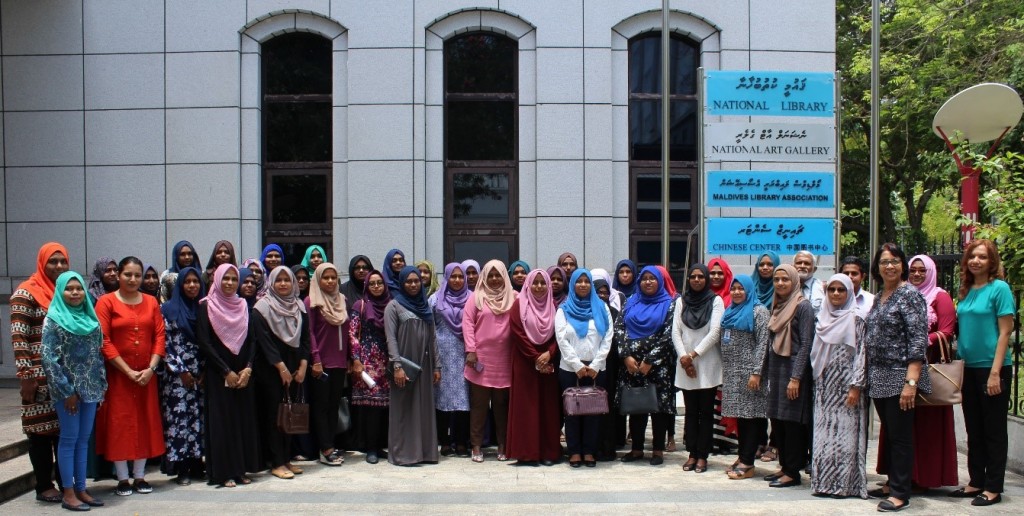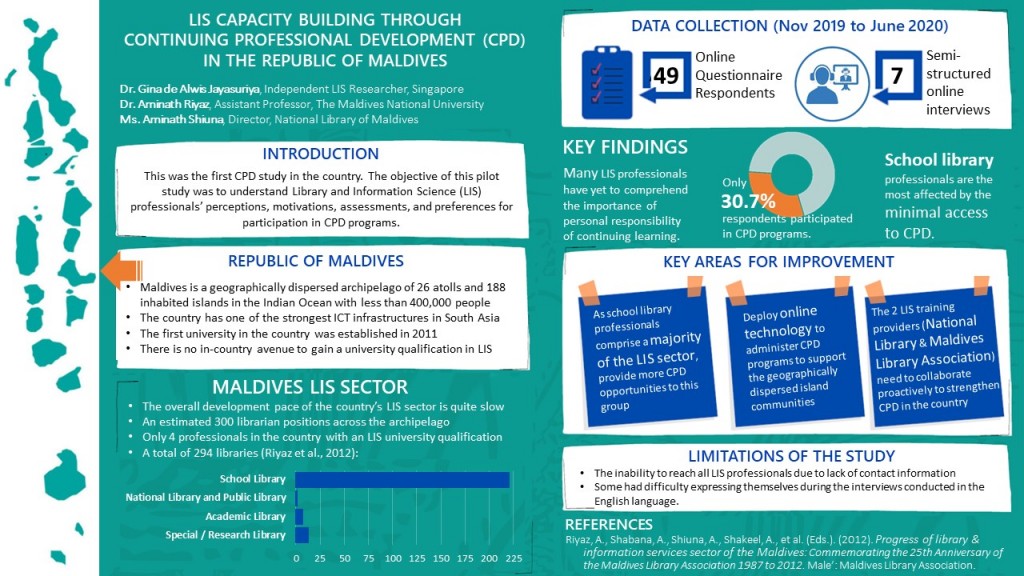Venturing into continuing education of LIS professionals in the Maldives
20 August 2021
The Maldives is a small island developing state in the Indian Ocean that has a strong Information Communication Technology (ICT) infrastructure comparative to many other countries in the South East Asia region. Being a popular tourist destination, and irrespective of the lack of natural resources other than white sandy beaches and ample fishing, the economy of the country is on a strong footing. At the same time, it is vulnerable to external shocks that disrupts the world economy or tourism sector inclusive of negative climate impact.
The populace enjoys a high universal literacy rate which places the Maldivian society at an advantage to reap the benefits of the information provisions made possible through ICTs. However, the library and information science (LIS) sector in the country has much more to do to keep pace with other in-country developments such as universal access to education including free access to higher education up to undergraduate degree, and also the universal access to the internet and smartphones leading to a technology savvy society.
In this backdrop, a project was commenced in 2019 exploring one central aspect that has ramifications on the development of the library sector. Qualified professionals are the engine who propel any profession forward. While the first library in the Maldives is known to have been established in 1945, to date, there are literally only a handful of qualified LIS professionals in the country. Agreeably, having a base qualification to begin with, and then continuous development of skills and knowledge is essential for librarians as well as libraries to remain relevant in a quickly evolving information landscape.
The Maldives National University (MNU) initiated the first in-country long-term library education program in 2010. This program commenced as a one-year certificate course, which was extended in 2012 to a Diploma. To overcome the shortage of local experts to teach these programs, the first two years of the program was taught by expatriate LIS professionals from Sri Lanka (Jayathunga Amaraweera, Deepali Talagala), Bangladesh (Dilara Begum), and Canada (Amman Adam).

In 2018, with the employment of a fulltime LIS professional, the MNU initiated curriculum development for a Bachelor Degree in LIS to cater to the cohort of students who have completed these earlier programs as well as to attract fresh school leavers to join the sector. The course curriculum has been finalised and the first batch will commence their studies within the next few months. The curriculum development for this program proceeded through stakeholder collaboration at various stages.
One such activity was the ‘Workshop on Library Development for Librarians and Library Managers’ held in April 2019 led by MNU and co-hosted by the National Library and the Maldives Library Association. One main purpose of this workshop was dialogue between library managers and librarians in various job ranks to ensure the proposed curriculum framework resonates with the sector.

The workshop was a collaboration between both authors of this article. Gina was pursuing a regional research project on continuing professional development (CPD) of the LIS sector across different countries and Aminath as the lead curriculum developer for the in-country LIS degree program. A project that explores CPD was seen to be a welcome enhancement to the MNU in their efforts to educate information professionals. Accordingly, the Maldives LIS sector was taken as a pilot study for the CPD project. Through this collaboration, both the authors of this article along with Aminath Shiuna and Mahasin Ahmed Didi from the National Library contributed to the workshop as resource persons.
This collaborative work has continued over the last two years and has been beneficial for both parties. The findings of the CPD pilot study highlighted the need to strengthen collaboration between the LIS stakeholders in the country and provides basic data to develop a CPD plan and strategies for the Maldives LIS sector. In the face of the ongoing pandemic situation as well as the identified desire by LIS professionals in the CPD study to have access to online CPD learning opportunities, the National Library has introduced a webinar series for librarians, a few of these sessions supported by Gina.

Additional readings
Further findings from the CPD pilot study can be accessed from:
- Journal of Education for Library and Information Science (Paper titled: Library employees’ perspective of capacity building through continuing professional development (CPD) in the Republic of Maldives),
- IFLA Journal (Paper titled: A review of LIS profession in the Republic of Maldives: development, challenges, and opportunities)
- International Knowledge Conference 2021 (Paper titled Library’s role in supporting SDGs in a SMART World: the reality in the Republic of Maldives).